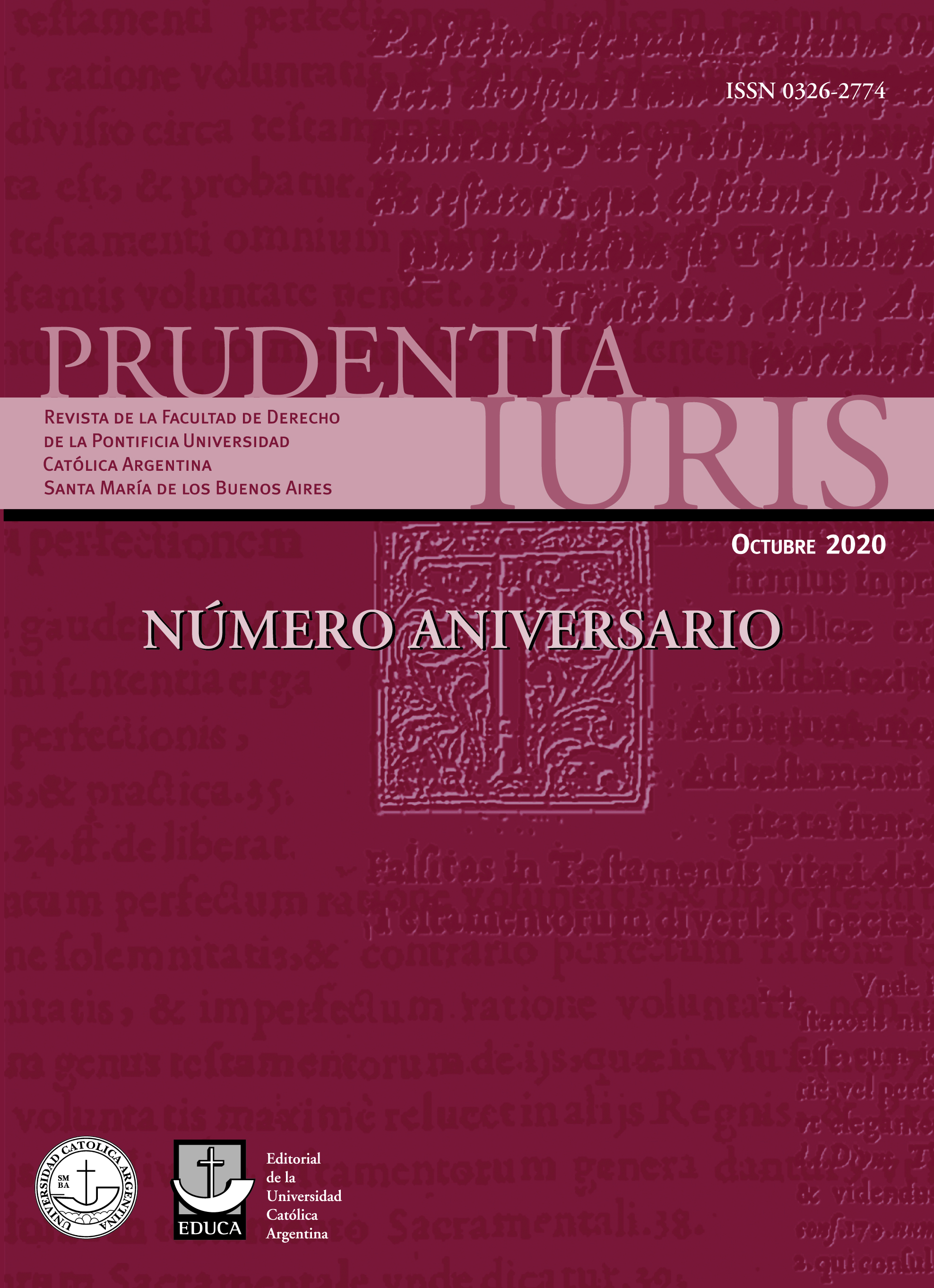Tomas de Aquino and the Natural Law Summa Theologiae cross interpretations I-II, 94, 2
Palavras-chave:
Tomás de Aquino, Summa Theologiae, Ley natural, Vías de conocimiento, Naturaleza humana.Resumo
The central text of western natural law is that of the Summa Theologiae, of Thomas Aquinas I-II, q. 94. a.2, in which the Aquinate refers to three types of realities: human nature, natural inclinations and human goods. In general, one of these types has been prioritized when studying the ways of knowing Natural Law, throwing other authors into the corner of errors, inaccuracies and even evil. This work supports the hypothesis that the study of nature, inclinations and goods as sources of natural regulations is not necessarily exclusive, and that a careful and dispassionate analysis leads to the conclusion that these are diverse but complementary ways, and that a study from the synergy of these sources of knowledge leads to richer and more explanatory solutions than those achieved by those who see them as exclusive alternatives.
Downloads
Referências
- AA. VV. (2002). The Ethics of Aquinas. Ed. S. J. Pope. Washington DC. Georgetown University Press, passim.
- Abbà, G. (1996). Quale impostazione per la filosofia morale? Roma. LAS, 27.
- Aristóteles. Ética Nicomáquea, I, 1, 1094 a 2-3. En este punto, véase: AA.VV. (2006). The Blackwell Guide to Aristotle’s Nicomachean Ethics. Malden-Oxford-Carlton. Ed. R. Kraut. Blackwell Publishing, 37-95.
- Armstrong, R. (1966). Primary and Secondary Precepts in Thomistic Natural Law Teaching. The Hague. Martinus Nijhoff, p. 40.
- Berlin, I. “The Crooked Timber of Humanity: Chapters in the History of Ideas”. Cit. por George, R. P. (1995). Making Men Moral. Civil Liberties and Public Morality. Oxford. Clarendon Press, 19.
- Boyle, J. “Natural Law and the Ethics of Tradition”. En AA. VV. (1994). Natural Law Theory: Contemporary Essays. Ed. R. P. George. Oxford. Clarendon Press, 3-30.
- Budziszewski, J. (2014). Commentary on Thomas Aquinas’s Treatise on Law. New York. Cambridge University Press, 228 y sigs.
- Clavier, P. (2010). Qu’est-ce que le bien? Paris. Vrin, passim.
- Composta, D. (1971). Natura e ragione. Studio sulle inclinazione naturali in rapporto all diritto naturale. Zürich. PAS-Verlag, 70-106.
- Copleston, F. C. (1991). Aquinas. London. Penguin, 232.
- Crowe, J. “Metaphysical Foundations of Natural Law Theories”. En AA. VV. (2017). The Cambridge Companion to Natural Law Jurisprudence. Eds. G. Duke & R.P. George. Cambridge-New York. Cambridge University Press, 103-129.
- Daguet, F. (2015). Du politique chez Thomas d’Aquin. Paris. Librairie Philosophique J. Vrin, 209-266.
- Ferrater Mora, J. (1979). Diccionario de Filosofía. T. 3. Madrid. Alianza, 2421 y sigs. - Finnis, J. (2011). “Is and Ought in Aquinas”. En Collected Essays-I-Reason in Action. Oxford. Oxford University Press, 147.
- Finnis, J. (2008). “La tradición de la ley natural”. En Ideas y Derecho, N° 6. Buenos Aires, 223.
- Finnis, J. “Natural Law”. En Collected Essays-Volume I-Reason in Action. Oxford. Oxford University Press, 200.
- Finnis, J. (2011). Natural Law and Natural Rights. 2ª ed. Oxford. Oxford University Press, 59-99.
- George, R. P. (2001). In Defense of Natural Law. Oxford. Oxford. University Press, 15-91.
- González, A. M. (2009). La ética explorada. Pamplona. EUNSA, 13-34.
- Grisez, G.; Boyle, J. y Finnis, J. (1987). “Practical Principles, Moral Truth and Ultimate Ends”. En The American Journal of Jurisprudence, Nº 32. Notre Dame, 107.
- Hervada, J. (1987). Historia de la ciencia del Derecho Natural. Pamplona. EUNSA, passim.
- Hittinger, R. (1987). A Critique of the New Natural Law Theory. Notre Dame-Indiana. University of Notre Dame Press
- Lisska, A. (1995). Aquinas’s Theory of Natural Law. Oxford. Clarendon Press, 143.
- MacIntyre, A. (1988). Whose Justice? Which Rationality? London. Duckworth, 12.
- Massini-Correas, C. I. (2012). “Entre reductivismo y analogía. Sobre el punto de partida de la Filosofía del Derecho”. En Persona & Derecho, Nº 67. Pamplona, 353-385.
- Massini-Correas, C. I. (2014). “Sobre bienes humanos, naturaleza humana y ley natural. Reflexiones a partir de las ideas de Javier Hervada y John Finnis”. En Persona & Derecho, Nº 70-71. Pamplona, 229-256.
- Mauri, M. (1997). “Autoridad y tradición”. En AA.VV. Modernidad y tradición. Una reflexión ética sobre la sociedad contemporánea. Barcelona. EDIT-EURO, 7-21.
- May, W. E. “Contemporary Perspectives on Thomistic Natural Law” y Long, S. A. “Natural Law or Autonomous Practical Reason”. Ambos en AA. VV. (2004). Thomas Aquinas and the Natural Law Tradition. Contemporary Perspectives. Ed. J. Goyette et alii. Washington DC. The Catholic University of America Press, 113-156 y 165-193.
- Murphy, M. (winter 2011 edition). “The Natural Law Tradition in Ethics”. The Stanford Encyclopedia of Philosophy. Edward N. Zalta (ed.), https://plato.stanford.edu/archives/win2011/entries/natural-law-ethics/.
- Pizzorni, R. (1974). “Il contenuto del diritto naturale secondo Tommaso d’Aquino”. En AA. VV. San Tommaso e la filosofia del diritto oggi. Roma. Studi Tomistici, 210.
- Tomás de Aquino. Comentario al libro Del Alma de Aristóteles, Lec. VI, n. 308. Conforme a la traducción de M. C. Donadío de Gandolfi (1979). Buenos Aires. Fundación Arché.
- Tomás de Aquino. Summa Theologiae, I-II, q. 94, a. 2.
- Villey, M. (1962). Lecons d’histoire de la philosophie du droit. Paris. Dalloz, 221-250.
Downloads
Publicado
Como Citar
Edição
Secção
Licença












